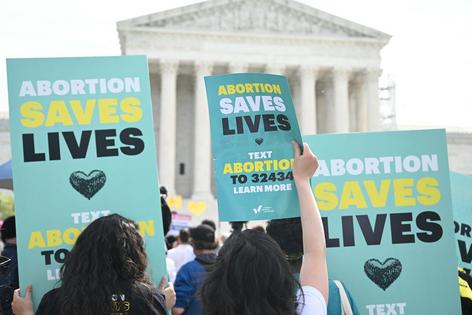Supreme Court sidesteps case on whether federal law on medical emergencies overrides Idaho’s abortion ban
Published in News & Features
On June 27, 2024, the U.S. Supreme Court dismissed a case brought by the federal government regarding whether Idaho’s abortion ban conflicts with a federal law called the Emergency Medical Treatment and Labor Act. The law requires emergency rooms to provide stabilizing care for patients experiencing medical emergencies regardless of their ability to pay.
The Conversation asked law professors Naomi Cahn and Sonia Suter to explain how the case ended up in the Supreme Court’s hands and why battles between this federal law and state abortion laws will likely be in the news for the foreseeable future.
In Moyle v. United States, the Supreme Court faced the question of whether the Emergency Medical Treatment and Labor Act overrides Idaho’s strict abortion ban.
Congress passed the law in 1986 to ensure patients’ access to emergency care even if they couldn’t afford to pay for it. It requires emergency rooms to stabilize patients if failing to do so would result in serious jeopardy to the patient’s health. The law does not require patients to be on the brink of death before treatment.
After the Dobbs decision overturned a federal right to an abortion in 2022, Idaho’s trigger law went into effect. The state law banned abortions except to save the life of a pregnant person and in some cases of rape and incest. The Biden administration challenged the law in federal court.
The federal government argued that the act requires providers to offer an abortion as stabilizing care in some obstetric emergencies, but that Idaho’s law would prohibit the abortion if only the patient’s health, but not life, was in jeopardy. Therefore, the government argued, the federal act overrides the Idaho law when the two are in conflict.
A federal district court sided with the Biden administration and ruled that Idaho’s ban doesn’t apply when the federal act would necessitate an abortion. So Idaho appealed to the 9th Circuit.
As a result of various procedural issues, the case was appealed to the Supreme Court before the 9th Circuit Court of Appeals reached a final ruling on the merits. The Supreme Court also blocked the district court’s ruling. As a result, doctors in Idaho could no longer perform abortions in emergency situations unless the patient’s life was threatened.
The practical impact of the Supreme Court’s action was stark. From January through April 2024, when the Idaho law was fully enforceable, St. Luke’s – the largest largest private employer in Idaho – medevaced six women to another state to obtain an abortion for health reasons.
In contrast, from late 2022 to the end of 2023, when the federal law governed, only one pregnant patient had to be airlifted out of state.
On June 27, the Supreme Court issued an unsigned (per curiam) opinion: At least five of the justices decided that the court was wrong to hear the case at this early stage. Accordingly, the case goes back to the 9th Circuit for further argument.
But there were four concurring and dissenting opinions, which provide insight into the court’s deliberations and may explain why it took so long for the court to issue its one-sentence opinion.
Justices Elena Kagan, Sonia Sotomayor, Amy Coney Barrett and Brett Kavanaugh and Chief Justice John Roberts thought the case should go back to the lower courts for further argument.
Justices Ketanji Brown Jackson, Samuel Alito, Clarence Thomas and Neil Gorsuch thought the court should resolve the question of whether the federal law overrides Idaho’s law. Their idea of how it should be resolved differed, however. Alito, Thomas and Gorsuch concluded that the federal law does not preempt Idaho’s law. Jackson thought there was a clear conflict between the laws and that “under the Supremacy clause, Idaho’s law is preempted.”
Jackson went further in excoriating the Supreme Court for not resolving what she saw as a clear and dire issue: “Today’s decision is not a victory for pregnant patients in Idaho. It is delay. While this Court dawdles and the country waits, pregnant people experiencing medical conditions remain in a precarious position, as their doctors are kept in the dark about what the law requires.”
The decision means that the Emergency Medical Treatment and Labor Act – at least for now – applies in Idaho. That is, in cases of medical emergencies, abortions must be an option if one is necessary to stabilize a pregnant patient and protect the patient’s health, even if their life is not at risk.
As Jackson noted, those scenarios could arise with many health conditions, like “preeclampsia, preterm premature rupture of the membranes, sepsis and placental abruption.”
It is worth emphasizing that in the rare cases when abortion is necessary to stabilize an obstetric emergency, the pregnancy is “often of a non-viable fetus”, Kagan wrote in her concurrence. Thus, if the federal law is followed, rather than wait until the patient is near death to perform the inevitable abortion, the necessary medical care can be provided earlier to prevent health complications.
While this decision now allows the federal law to block the Idaho abortion ban in cases of obstetric emergencies that can only be stabilized with an abortion, it still allows Idaho to prohibit all other abortions. Thus, Idaho’s ban of all other abortions except in limited cases of rape or incest still applies. Of course, it remains to be seen what the 9th Circuit will decide about the effect of the federal law on Idaho’s abortion ban.
Probably not.
The Supreme Court will likely have another opportunity to consider whether the Emergency Medical Treatment and Labor Act overrides state abortion bans that conflict with it. The case is going back to the 9th Circuit to decide whether there is a conflict between Idaho and federal law. The losing party will probably appeal to the Supreme Court.
In another case pending before the Supreme Court, Texas has challenged the Biden administration’s assertion that the federal law preempts laws that would ban abortions in cases of obstetric emergencies. Both the lower federal court and the 5th Circuit concluded that the federal act did not override Texas’ abortion bans.
The Biden administration asked the Supreme Court to consider the Texas case, but the court has not yet decided whether to do so. If it does, then the questions related to the federal law will be back again in the next Supreme Court term, which begins in October.
By the time the case gets back to the Supreme Court, a different president may have taken office, and their administration may have a different view of what the act requires.
Because there are two conflicting federal court rulings in the 9th and 5th circuits on whether the federal law overrides state abortion bans, this Supreme Court ruling has no impact in other states.
In dismissing the case rather than addressing its merits, the Supreme Court has not taken a position as to whether the federal law preempts state laws when there is a conflict. This means that health care providers in the many states that have enacted near-total abortion bans still face a dilemma where, as public health professor Sara Rosenbaum put it, pregnant patients have “become radioactive to emergency departments.”
It is also noteworthy that this is the second time in a single month that the court has ducked an abortion-related issue. Earlier in June 2024, it dismissed a challenge to abortion pill access – leaving many unsettled questions about access to abortion in the United States.
This article is republished from The Conversation, a nonprofit, independent news organization bringing you facts and trustworthy analysis to help you make sense of our complex world. It was written by: Naomi Cahn, University of Virginia and Sonia Suter, George Washington University
Read more:
Supreme Court unanimously concludes that anti-abortion groups have no standing to challenge access to mifepristone – but the drug likely faces more court challenges
Can states prevent doctors from giving emergency abortions, even if federal law requires them to do so? The Supreme Court will decide
Most state abortion bans have limited exceptions − but it’s hard to understand what they mean
The authors do not work for, consult, own shares in or receive funding from any company or organization that would benefit from this article, and have disclosed no relevant affiliations beyond their academic appointment.











Comments